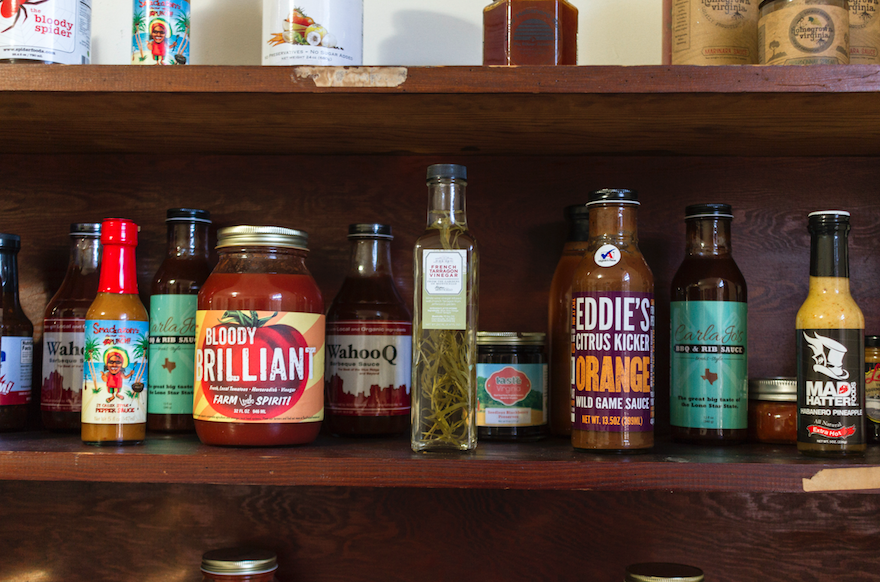A tin-canned success story
Published 7:12 am Thursday, October 27, 2016

- CARSON REEHER | HERALD Some of the commercial products that have been produced in the cannery sit on a shelf.
All it takes is a can-do attitude and a basket of ingredients to achieve success at the Prince Edward County Cannery.
Now that stew season has begun, churches, organizations and families are taking full advantage of everything the cannery has to offer.
Trending
Last Friday, the Ruritan Club utilized the cannery’s large-scale cooking facilities to prepare its annual stew for the 50th year.

CARSON REEHER | HERALD
The Prince Edward Cannery sits on Abilene Road and is open to home canners, as well as commercial clients.
Throughout the day, churches and families tried their hand at preparing stew and canning foods.
Patty Gulick, cannery manager, would like to see even more community members using the facilities on Abilene Road.
“This place really makes people happy,” she said.
Not everyone comes in happy, but they all leave happy, Gulick said.
Last Friday alone, there were nearly 30 people in the cannery, working together toward a common goal.
Trending
The cannery provides a unique service, in that people from all walks of life feel compelled to make use of its services. Gulick said she often sees diverse crowds of people become friends while canning. Rich and poor guests will share recipes and stories as they work, she explained, never knowing the other person’s background.
She said the cannery is a good resource for those looking to pursue healthy eating because you gain a consciousness of the foods you are eating you don’t have when buying cans from the store.
“This is an awareness that needs to be out there. A lot of good comes out of this cannery,” Gulick said, as she told the story of one woman who comes at the end of fall each year to can potato soup to hand out to the homeless.
Others, Gulick said, will give their leftover produce to those in need so they can come can food for less than it would cost to buy it at the store.

CARSON REEHER | HERALD
Ruritan Club members take turn stirring a large batch of stew.
For only $1 and the price of the cans, Prince Edward, Charlotte, Cumberland and Amelia County residents can use the home canning facilities. Other counties are also welcome, for a 30 percent surcharge and the price of cans.
According to Gulick, the Prince Edward County Board of Supervisors has been instrumental in maintaining the cannery. County Administrator Wade Bartlett said the board has seen value in the cannery and has supported it over the years. He said much of the funding used to buy new equipment and keep the cannery running comes from Tobacco Commission grants.
“They want to do all they can to help Virginia farmers,” Bartlett said.
There are not very many canneries left in Virginia, Gulick explained, because the art of canning is going away. Prince Edward’s cannery is probably one of the largest remaining, she said.
Gulick said she would like to see more people in the 30-40 age range come to the cannery.
“If your parents didn’t can, then you don’t know about canning,” she said.

CARSON REEHER | HERALD
Large batches of cans are stored in the back room of the facility, waiting to be filled by canners.
As many as five generations may come to the cannery to prepare food. Kids learn the value of cannery from their older relatives.
People will make cakes, such as fruitcakes, apple butter or even applesauce to give as gifts during the holidays. It’s not unusual to see people carrying large batches of food to preserve.
Gulick said, there may be 130 people who visit the cannery during a normal year, but they will come back five or six times during the year.
Commercial users, such as Monticello and Back Pocket Provisions, find comfort in the commercial kitchen side of the cannery. With an appointment, businesses can begin building up success by starting with small batches.
Sauces, such as Eddies Citrus Kicker, and Bloody Mary mixes, such as “Bloody Brilliant,” have earned followings after being mass produced in the commercial kitchen.
They are always working to form more commercial partnerships and help local businesses with their canning needs.
Gulick said she started working with the cannery five years ago and never looked back.
“I’ll stay here 40 years if they’ll leave the door open. I love this cannery,” she said.

CARSON REEHER | HERALD
A large bowl of the Ruritan Club’s 50th stew cooks for the year.





